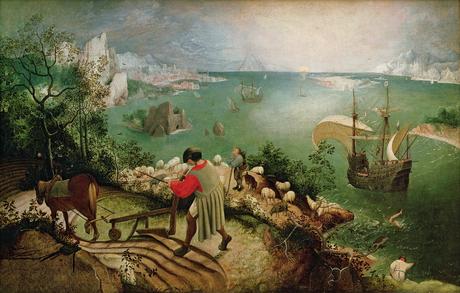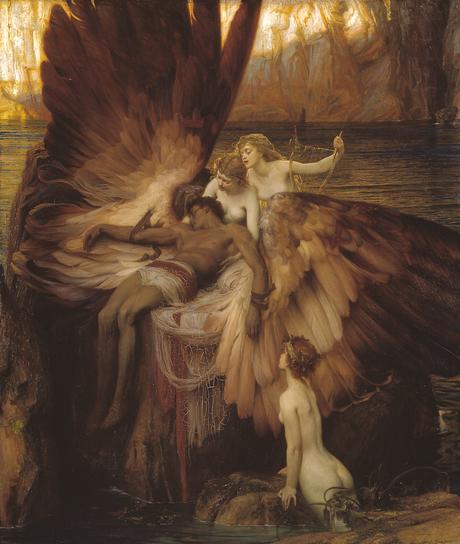
Have you read What Painting Is, by James Elkins? Much like the now infamous art history teacher of my university past, he argues that paintings are in fact about…the paint. Or rather, the alchemical, transformative nature that paint must undergo in order to become what we eventually see before us: a finished painting. It is easily one of the most creative and well written books I have come across. In the book Elkins studies Landscape with the Fall of Icarus, by Pieter Bruegel (above).
In his explorations of the alchemy of paint, from the mining of pigment, to the interpretation of the finished piece of art, he asks what is Alchemy? And the reader soon learns: it is the practice of taking a finished product (such as the paint medium, or the finished painting) and extraction from it until one has the original, and purified elements used to create it. Essentially: taking something whole, and reducing to stand-alone (pure) individual pieces.
Though Icarus is in the name of the paintings title, the only thing that remains visible of him is a pair of legs splashing into the water…perhaps only seen due to the contrast of a man’s red cap that guides the viewers eye to him. How long, reader, did you search for Icarus? How often does aspiration snuff out before our eyes completely unnoticed? And further, does anyone within in the painting seem to care that Icarus is drowning, having fallen from the sky?
I often hear ourselves say that our favorite archetype is the small light that pierces the darkness - the bird who dares to illuminate the night with its song…we believe that we cheer on the bravery that springs from the chest daring to hope, or that we root for the boy who defiantly flies toward the sun, seeking new heights to explore. But what isn’t explored is the hypocrisy: collectively, if the downtrodden are too close, we experience discomfort to see them do poorly - and perhaps just as much, disdain to see them to (too) well. To separate too far from the status quo is (perceived as) a direct threat. In a culture of individuality, the betterment of one is detrimental to all, while the collective mire is the social paradigm.
My activist community leaders know what I allude to. The police chiefs know what I speak of…and when it comes to social justice movements, they count on it. The “affirmative action” generation knows this all too well. The Black woman in a corporate office who dares to wear her natural hair to the Executive meeting understands this. The parents of the biracial child have perhaps…failed to understand this at all; They believed themselves the brave ones while simultaneously failing to stand in-step with the child they brought into the world. Dreamers don’t always beget dreamers. Sometimes dreamers leave behind nothing but feathers and wax and legend. But maybe heroic responsibility is a trap, and maybe it’s owed to no one other than the one who dared to dream.
I’ve heard it in the Black voices of suburban families: The cautions of not getting too close nor too comfortable, not dreaming too big, and the harsh truth of: “existence in itself is a form of protest”. But the biracial child? Ask them to speak and see whom they dare to trust. I’ll tell you a secret - it is no one: because no one has a place for them as a whole (they must choose to be one or the other, even if it does not choose them). And much like the boy covered in wings, we’re all here trying to figure out how much room we’re allotted to take.
Icarus didn’t fall to his death because he dared to dream. Icarus fell because his community rejected his desire to do better… His father granting him the ability to do the impossible, only to tell him to think small. The canary didn’t sing because it was weak - it sang because all others refused to. The canary dropped dead in the coal mine because there were others who were deemed much too valuable to risk the potential reward. Both the canary and Icarus are told as cautionary tales because their stories were told by those who watched from the sidelines: their stories were told by the survivors. But not all who died did so in vein…perhaps Icarus laughed as he fell...finding death on his own terms, of his own free will.
History often rewrites the brave and trailblazing actions of others as cautionary tales. Dreams are watered down into cozy sound bites that barely resemble the booming timbre of what originally filled the chest…it is impossible to soar for the sun with a featherweight conviction. No, the potential had been realized; even the seemingly impossible one. But one will be damned if they fail to take into honest account those who stand on the sidelines passively (or actively) hoping to see grand achievements repackaged as caution: it’s a rewriting of a truth that they haven’t understood.
Before the events of May 2021 I used to believe that wanting something good was inherently good in and of itself…and that through its simplicity of goodness, those desires would in turn attract the well meaning of all others. Looking back I’m embarrassed by the naïveté. (It’s through this embarrassment that I question whether heroic responsibility does indeed have its place within communities and collective morale.)
What I am not embarrassed of, and what I do find comfort in are the stories of the two ill fated dreamers of Icarus and the Canary. Daring to dream and falling from grace…doesn’t mean failure. The dream, the song, the flight -these are the accomplishments that must be remembered. The canaries in the coal mine still flew where others refused to: Icarus soared to heights so high that he sought to kiss the sun…to which he very nearly succeeded - is this not why the sun was able to melt the wax off his wings?
The survivors who watched from a safe distance would say that they failed…But these are not the ones we should be listening to; for it’s often those who stand to the side that try to moralize and explain away the dreams of others when they themselves remained at a safe distance, and played small. But who are they to attempt to moralize or place caution to a dream, or a view they’ll never make sacrifices see?



